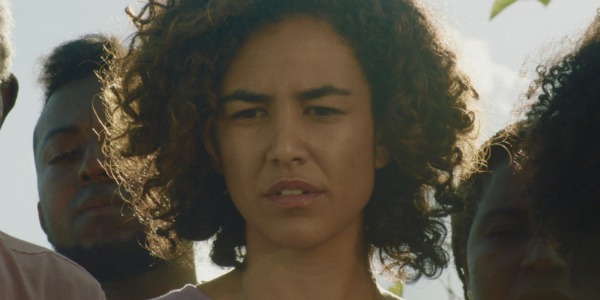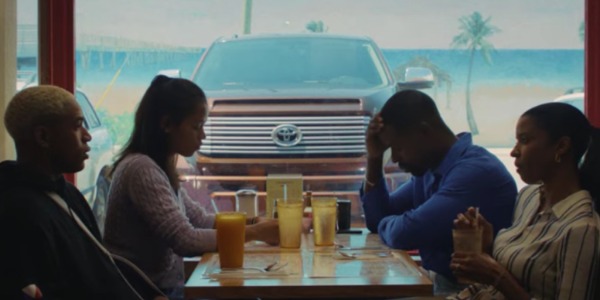Film Fest 919 Report 1: BACURAU, WAVES & SORRY WE MISSED YOU

I'm a student at the University of North Carolina at…
As someone who has followed the festival circuit closely ever since I was in middle school, I love the romanticized idea of traveling around to different film festivals all over the world. In an ideal universe, I would make trips to Venice, Cannes, and everything in between, watching films and seeing everything the festival world has to offer.
Unfortunately, I’m just a college student who doesn’t necessarily have the time to skip classes and delay coursework in order to make impromptu festival trips. I attended the Toronto International Film Festival as a high school senior (strange, I know), and despite my repeated attempts to make a follow-up trip happen, I eventually accepted that this would stand as my only festival experience.
Enter Film Fest 919. Founded by Randi Emerman, Carol Marshall, and Claudia Puig, the Chapel Hill, North Carolina-based festival—which, naturally, is the location of my college—launched in 2018 with a spectacular lineup, including Netflix heavyweight Roma, Best Actress winner The Favourite, and eventual Best Picture winner Green Book. It was my pleasure to attend and cover the festival in its debut year, and from the moment the first annual Film Fest 919 ended, I was already eager to return in 2019 for another weekend-long cinematic odyssey.
However, as acknowledged by Emerman and Marshall in their opening remarks at the festival, 2018’s impressive assortment of Oscar-caliber films set a high bar for the fest’s second year. Films that played at 919 won five of the eight major Oscars—is it even possible to top such an accomplishment? The short answer? Yes. From October 9-13, Film Fest 919 brought Oscar heavyweights and foreign favorites to the Triangle area (local lingo for the three cities of Raleigh, Durham, and Chapel Hill), including several films that could be in the thick of the race come February. I was thrilled to return to the festival, and I’m even more thrilled to bring reviews of 16 festival titles to Film Inquiry.
Without further introduction or delay, here is my first dispatch from 919, which includes reviews of Brazil’s genre-bending Oscar entry, Trey Edward Shults‘ emotional epic, and Ken Loach‘s latest social drama.
Bacurau (Kleber Mendonça Filho & Juliano Dornelles)

White supremacist colonizers get what’s coming to them in Kleber Mendonça Filho and Juliano Dornelles‘ Bacurau, an often ambiguous film that, after a long and vague slow burn, eventually becomes a full-blown exploitation pic. Heads will roll and blood will spill, as the peaceful villagers of the town of Bacurau face off against the monsters who are hunting them down one-by-one for sport; at times, it plays like an updated version of A Most Dangerous Game, albeit, one that’s saddled with added socio-political context. With such an exciting, strange conceit and the presence of a genre-bending, John Carpenter-infused cinematic energy, it seems weird to emphasize that Bacurau never truly works. The film’s stylish excess, coupled with its insistence on operating in a mode of uncertainty for far too long, renders it a tiresome experience.
Amusingly, for a film that eventually takes some strange detours, Bacurau has an inconspicuous introduction, with nurse Teresa (Barbára Colen) returning to her hometown as her grandmother lies on her deathbed. The town of Bacurau is rather close-knit and remote, so the death of a woman who lived to such an advanced age is a cause for community-wide mourning and celebration. For Teresa, it’s also a re-introduction to the town’s political situation, which is continually a source of instability and anger. The citizens of Bacurau are locked in a conflict with shamelessly corrupt politician Tony Jr. (Thardelly Lima), a leader so widely hated the townspeople hide when his gaudy caravan rolls into town. With access to food and water proving to be increasingly limited, Plinio (Wilson Rabelo) and other community leaders emphasize that Bacurau must remain united.
Then things get….. weird. One day, Bacurau disappears off the map. Later, there’s the unexpected appearance of a UFO outside of town. Then the outsiders start rolling in and the bodies start piling up, which can only mean one thing: Bacurau is under attack.
From here, it gets bloody and nutty, but there’s something about Bacurau‘s slow drip of strangeness that doesn’t full satisfy. Mendonça Filho and Dornelles establish a variety of unique strands—a tense political atmosphere, a community on edge, the steady invasion of outside forces—and suggest an impending subversion, a way of pulling out the rug from viewers with a major twist. This does indeed happen, but it feels far less surprising and shocking than one would expect. Here, I suppose its effectiveness depends on how much you know going in: if, like me, you’ve already heard the numerous comparisons to famous genre movies, then you won’t be surprised when Bacurau goes off the rails.
Then again, some of this must be chalked up to Mendonça Filho and Dornelles‘ undying adherence to a strategy of suggestion and vagueness, an insistence on implication that makes the many exciting elements feel more than a little dull. The film’s use of a genre narrative to present a colonial critique is rich and intriguing—several Brazilian audience members offered fascinating insights at the post-screening Q&A, which made me wonder if some added historical knowledge would have improved my own experience. Regardless of historical background, it is undeniably entertaining to watch the townspeople strike back against their oppressors, who are some of the most despicable villains of the year. They get what’s coming, that’s for sure.
Yet for all the pleasures offered by Bacurau, it is a film without much of a center—its central town is a fascinating creation, but its citizens remain, for the most part, undefined ciphers. After a while, the film’s steely, hyper-stylized trappings begin to feel thin and unsatisfying as well.
Waves (Trey Edward Shults)

Waves, the latest film from Krisha and It Comes at Night director Trey Edward Shults, is the work of a young filmmaker who is completely and utterly high on his own supply. Everything in this grandiose, quasi-Greek tragedy of a third feature is dialed up to 11, so exaggerated in its intensity that it rapidly envelops you by sheer force of will. Shults is a filmmaker who likes to call attention to his own direction—and to the medium itself—by incorporating aspect ratio changes, restless camera work, and an accelerated pace, all in service of one Miami family’s emotional journey. But make no mistake: this is a long, grueling, and often abrasive journey, a film that prefers sensory overload over subtlety. Waves is so deeply anxiety-inducing that I’ll be shocked if even the supposed feature-length panic attack of Uncut Gems can top it; it’s so unpleasant that it makes Joker look like a Pixar film.
It is also a rewarding and harrowing experience that I haven’t been shake in the days since I first saw it.
Waves plays as a bifurcated narrative, split by an event of such sheer, unadulterated trauma that I’m not sure if it’s ingenious, cruel, or both. The first half of the film introduces viewers to the Williams family: controlling father Ron (Sterling K. Brown), kind-hearted mother Catharine (Renée Elise Goldsberry), reserved sister Emily (Taylor Russell), and most importantly, Tyler (Kelvin Harrison, Jr.), the center of Shults‘ narrative orbit. Tyler is a top-notch high school wrestler, and at the start of the film, the world is his oyster. He’s enormously popular at school and currently dating the beautiful Alexis (Alexa Demie), who he loves with all his heart.
But the veneer of perfection masks some troubling events bubbling under the surface. His father is a maniac as a strength and conditioning coach, pushing Tyler beyond any reasonable expectations for a young man. In addition, Tyler’s shoulder is beginning to buckle under the weight of the pressure: doctors warn him that if he doesn’t stop wrestling to receive surgery, he may never be the same again. With crippling pain, Tyler’s story becomes a familiar one for the American athlete: popping pills left and right, washing it down with alcohol and other drugs. It all gets worse when Alexis reveals to him a terrifying truth—she’s pregnant, and she wants to keep the baby.
To say what happens next would constitute something of a spoiler, so for those who fear such reveals, I’ll keep it vague. But it goes without saying that Shults reaches something of a dramatic apex at the film’s mid-point, bringing the tragic strands of Tyler’s life crashing together in a nervous breakdown of a setpiece that is as nauseating as it is impeccably composed. From this crescendo, which provoked an audible and virtually involuntary response from my festival audience, Waves shifts into a more reflective, poignant emotional register.
Here, the film goes from being an impressive technical exercise to functioning as something more profound. Not to diminish the sheer filmmaking skill displayed by Shults in the first half, but it’s one thing to shock and beat an audience into submission—it’s another thing altogether to find something profound to say about this nightmare. Primarily through the depiction of Emily’s moving, nurturing relationship with new boyfriend Luke (Lucas Hedges), Waves becomes a film about moving on from tragedy and reclaiming life’s beauty in the face of loss and heartbreak. Shults still piles on the trauma a bit thick, and I’m not sure Harrison‘s Tyler has enough dimensions to deserve his ultimate, almost pre-ordained fate. But by the film’s conclusion, there’s no denying that Shults, at long last, reaches a moving and authentic catharsis.
Sorry We Missed You (Ken Loach)

One of my favorite trends at Film Fest 919 is getting the chance to see films from iconic directors who I’m relatively unfamiliar with, despite their revered status as masters of the medium. Last year, it was Olivier Assayas‘ Non-Fiction, which prompted me to explore more of the French director’s incredible work. This year, the surprise of the festival was British filmmaker Ken Loach‘s Sorry We Missed You, a title I included in my schedule simply because it filled a nice open slot. I must admit, I had minimal expectations, especially with the muted Cannes reception. Yet Loach‘s film more than earns your attention as a viewer, providing a moving, detailed, and tragic portrait of a family suffering under the weight of an economy stacked against them. It’s quite brilliant, and it deserves a whole lot more attention than it’s currently getting.
Sorry We Missed You follows Ricky Turner (Kris Hitchen), a working-class man who believes he’s finally struck gold with a new opportunity. Over the years, Ricky has worked every job imaginable, and now, he’s jumping at the chance to earn a piece of his own business. But it’s not exactly a traditional arrangement—he signs a deal with an Amazon-esque package delivery service, where he gets to own the van and deliver the parcels, despite still being beholden to the whims of a dictatorial boss (Ross Brewster, a standout as a human being of unparalleled awfulness). Ricky sees this as a big money-making opportunity, even though he’ll have to spend a large sum of money on a van and work long, grueling hours.
Ricky’s major career change has a significant effect on everyone else in his family. Abbie (Debbie Honeywood), Ricky’s beloved wife and best friend, sells her car to provide money for the van; she starts taking the bus to her job as a senior care specialist. But Ricky’s intense dedication to his new job has even greater ramifications on his children, both of whom are going through a rough period. Seb (Rhys Stone) is a gifted and passionate artist, but he spends most of his days ditching school, running around the streets of Newcastle with his graffiti-obsessed friends. Meanwhile, Liza Jane (Katie Proctor), Ricky and Abbie’s youngest daughter, needs her parents more than ever, at a time when they really can’t be there for her.
This is a truly bleak film. Yet of all the recent family melodramas, Sorry We Missed You is the least cinematic and, perhaps, the most effective in landing its dramatic punches. While Loach‘s style of working-class realism never spices up the action with dramatic camerawork or a tug-on-the-heartstrings musical score, the grim trajectory of the Turner family’s domestic life from relative stability to disaster is moving enough on its own. Ricky and Abbie are good, kind-hearted, and thoroughly likable people, and they share a number of happy moments with their children. Unfortunately, the film’s depicted economic situation is a bomb waiting to explode at the first sign of trouble: we know this won’t end well.
Loach‘s portrait of quiet domesticity inevitably makes the family’s deterioration into stress, anger, and even violence that much more upsetting. These characters don’t deserve their given fate, and even their actions under pressure feel more involuntarily than detestable. Sorry We Missed You is, by design, an infuriating film, and it’s difficult not to be angry at the brutal realization that its conclusion is a stark reality for many. Its maddening depiction of corporate bureaucracy is enough to make anyone’s blood boil, and its sympathetic portrait of four people buckling under pressure is enough to break your heart. Loach‘s unity of these opposing emotional states is nothing short of genius.
At a festival that was seemingly preoccupied by two ideas—the viciousness of contemporary capitalism and the modern family’s collapse into crisis—Sorry We Missed You is the ultimate combination of those vital concepts. The results are absolutely shattering.
Look for more reports from Film Fest 919 in the coming days!
Which of these titles are you most excited to see? Do you think Waves will be a factor in the Oscar race? Let us know in the comments below!
Does content like this matter to you?
Become a Member and support film journalism. Unlock access to all of Film Inquiry`s great articles. Join a community of like-minded readers who are passionate about cinema - get access to our private members Network, give back to independent filmmakers, and more.
I'm a student at the University of North Carolina at Chapel Hill. For 8 years, I've edited the blog Martin on Movies. This is where I review new releases, cover new trailers, and discuss important news in the entertainment industry. Some of my favorite movies- Casablanca, Inception, Singin' in the Rain, 2001: A Space Odyssey, The Wolf of Wall Street, The Nice Guys, La La Land, Airplane!, Skyfall, Raiders of the Lost Ark. You can find my other reviews and articles at Martin on Movies (http://martinonmovies.blogspot.com/).













